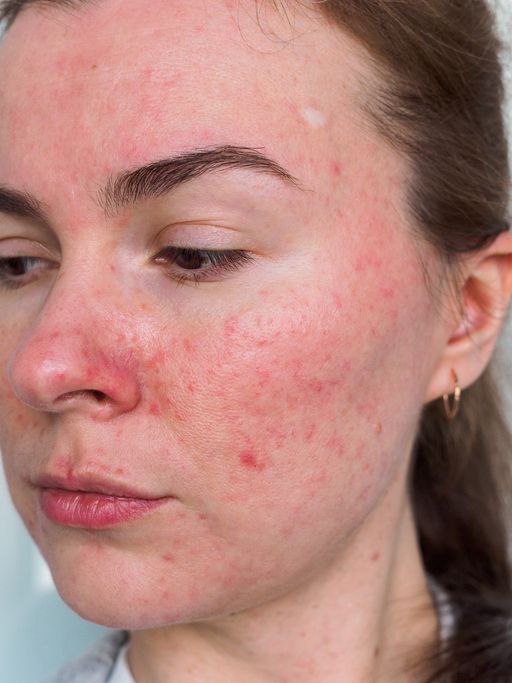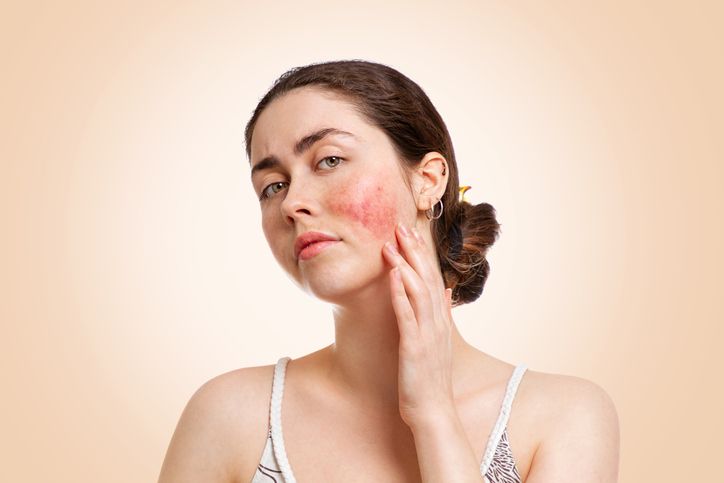
- Home
- Trend
- Weight Loss Strategies
- Acne Tips
- Hair Health Information
- Blemish Removal Tips
- Acne Scar Removal Tips
- Muscle Building Techniques
- Intimate Care Tips
- Postpartum Intimate Care
- Eye Bags Wiki
- Tips for Face Slimming
- Secret of Permanent Hair Removal
- Breast Enlargement Tips
- Cure to Snoring
- Marionette Lines
- Skin-Tightening Secrets
Rosacea, also known as acne rosacea or rosacea erythema, is a chronic skin condition that resembles acne in appearance but differs in cause and symptoms. It causes widespread redness across the face, making sufferers look as though they’re constantly flushed or sunburned. Thankfully, rosacea isn’t contagious through air or contact, but for those who care about their appearance, the red patches are far from festive—they’re a source of frustration and discomfort. If you’re experiencing rosacea symptoms, don’t wait—book a consultation with a dermatologist and consider treatment as soon as possible.
What is Rosacea? What Are Its Symptoms?

1. Facial redness—especially on the forehead, chin, cheeks, nose, and ears—caused by blood vessel dilation. Close inspection reveals visible spider veins.
2. Bumps and pustules that resemble acne, often with whiteheads or blackheads.
3. In severe cases, the skin thickens and develops nodules and granulomas.
4. The affected areas may feel burning or stinging.
5. Over time, nasal swelling and congestion can lead to rhinophyma (bulbous nose).
6. Ocular rosacea may occur, causing bloodshot eyes, foreign body sensation, blurry vision, light sensitivity, and discomfort around the eyes.
What Causes or Triggers Rosacea?

1. Genetics – Rosacea often runs in families. While you can’t control your genes, managing daily habits and seeking early medical attention can help control the condition.
2. Sun Exposure – UV rays damage skin and accelerate aging, contributing to rosacea development.
3. Wearing Masks Long-Term – Due to work or the pandemic, prolonged mask use can trap heat and sweat, aggravating rosacea.
4. Heat Exposure – Hot water, saunas, and blow-drying the face can dry the skin and trigger excessive oil production, worsening rosacea. This is why flare-ups are more common in summer.
5. Dietary Triggers – Spicy foods, alcohol, caffeine, smoking, and hot soups or noodles (from rising steam) can all provoke flare-ups.
6. Mites – Mites on the skin can cause allergic reactions and redness. They thrive in bedding, carpets, pet fur, and unclean skin.
7. Irritating Products – Skincare, makeup, sunscreen, and makeup removers may contain ingredients that irritate sensitive skin and trigger rosacea.
免費體驗
Acne Treatment
1 Minute Self-Registration
Date should not be before minimal date
How Can Aesthetic Treatments Help Improve Rosacea?
Rosacea can be treated using photodynamic therapy, which includes laser and intense pulsed light (IPL) treatments.
Laser Treatment for Rosacea
How it works:
Laser emits a single, stable wavelength that penetrates deep into the skin, targeting dilated blood vessels and reducing redness and inflammation.
Treatment steps:
1. A dermatologist or aesthetician assesses the severity of the rosacea and reviews the patient’s medical history.
2. A laser with a specific wavelength is applied to areas affected by rosacea, usually the forehead, cheeks, and chin.
3. Post-treatment guidelines are provided to ensure proper healing and minimize side effects.
IPL Treatment for Rosacea
How it works:
IPL (Intense Pulsed Light) uses high-intensity pulses absorbed by hemoglobin in dilated vessels and red patches. The heat damages the vessel walls, prompting the immune system to clear and repair the area, forming healthy new vessels.
Treatment steps:
1. The doctor examines the skin and identifies treatment areas.
2. A cooling gel may be applied to reduce discomfort from the heat.
3. The IPL device delivers pulses of light to the affected area. Settings may be adjusted to treat acne scars or other issues simultaneously.
4. After the session, skincare advice is provided, and follow-ups may be scheduled.
Post-Treatment Care for Rosacea Laser or IPL Therapy
1. Choose a Licensed Clinic – Always go to a reputable dermatologist or certified aesthetic clinic with experienced practitioners.
2. Avoid Sun Exposure – Stay out of direct sunlight and use sunscreen religiously. Avoid hot baths, saunas, and using hot water on your face.
3. Avoid Makeup – Skip cosmetics on the day of treatment. Harsh ingredients in makeup and skincare may irritate freshly treated skin. Use gentle, fragrance-free moisturizers instead.
4. Avoid Hair Removal and Tanning – Waxing or tanning can further damage treated skin, making redness worse.
5. Maintain Facial Hygiene – Wash with cool water and a gentle cleanser. Pat dry with a soft towel without rubbing.
6. Cool Down the Skin – Mild redness or burning can be soothed with aloe vera gel or a damp towel. Avoid ice packs, as extreme cold can damage skin tissue.
7. Attend Follow-Ups – If you experience worsening symptoms or discomfort, notify your doctor immediately.
Laser vs. IPL for Rosacea: Which Is Better?
Doctors or aestheticians will recommend the most suitable treatment based on your skin condition. Each option has pros and cons.
Laser Treatment
• Emits a single focused beam—ideal for severe rosacea with extensive redness and visible blood vessels.
• Precisely targets vessels without damaging surrounding skin.
• More intense and may cause discomfort during treatment.
• Can also be used for acne, tattoos, hair removal, pigmentation, and more, but with different wavelengths.
IPL Treatment
• Best for milder cases.
• Broad-spectrum light treats rosacea along with acne scars and pigmentation.
• Less painful, but requires more sessions for lasting effects.
• The scattered light may affect healthy skin nearby.
免費體驗
Acne Treatment
1 Minute Self-Registration
Date should not be before minimal date
How to Prevent Rosacea?
Prevention is better than cure, especially since rosacea isn’t easily eliminated in a single treatment.
Prevention Tip 1 – Minimize Irritation
Choose hypoallergenic, gentle products with minimal additives. Avoid harsh rubbing, high temperatures, and polluted environments. Don’t wash your face with hot water or visit saunas and steam rooms often.
Prevention Tip 2 – Watch Your Diet
Avoid spicy foods, alcohol, caffeine, and steaming hot dishes. Instead, eat antioxidant-rich and vitamin C/E foods like tomatoes, carrots, spinach, green tea, berries, and citrus fruits. Stay hydrated and avoid sugary or greasy foods.
Prevention Tip 3 – Keep Personal Items Clean
Wash your face twice a day with a mild cleanser. Regularly clean towels, pillowcases, bedding, and even your pet’s fur if you own one to reduce mite exposure.
Prevention Tip 4 – Sun Protection
Use sunscreen that blocks both UVA and UVB with SPF 30 or above. Apply it to all exposed skin and reapply every two hours. Consider wide-brimmed hats or scarves for extra protection.
The Safest Way to Deal with Rosacea? Try a Professional Treatment! — Book a Free Perfect Medical Acne Treatment Now!
Whether your rosacea is mild or severe, it can affect your appearance and confidence. Because rosacea is highly sensitive to temperature and friction, improper care will only worsen the condition.
Perfect Medical is one of Hong Kong’s most experienced beauty clinics. Its Acne Treatment uses gentle spiral suction and medical-grade serums to cleanse dirt, oil, and dead skin, preventing clogged pores and reducing blood vessel dilation. Deep hydration replenishes the skin to prevent both rosacea and acne. The treatment also boosts collagen, improves elasticity, shrinks pores, and reduces redness—leaving your skin smooth, radiant, and healthy.
Good news for first-time customers! Fill in the form via the link below to enjoy a free trial session. Don’t miss this great offer!
Experience Now: Perfect Medical Acne Treatment免費體驗
Acne Treatment
1 Minute Self-Registration
Date should not be before minimal date
FAQ

What are the symptoms of rosacea?
Facial redness resembling a flushed or sunburned look, especially on the nose, which may swell (called rhinophyma). In moderate to severe cases, there are also bumps, pustules, and granulomas. Burning and stinging sensations are common.
Who is more likely to develop rosacea?
Most rosacea patients are women aged 20–40 with fair skin, where blood vessels are more visible. However, men can also develop rosacea.
Do medications work for rosacea?
Medications like antibiotics can reduce inflammation and redness, but they’re generally less effective than phototherapy. They can be used as a supplementary treatment after consulting a doctor.
Won’t laser and IPL treatments make the skin drier and redder?
Traditional laser and IPL treatments can potentially cause skin dryness because they emit heat, which may lead to moisture loss in the skin. However, lasers and IPL specifically designed for treating rosacea are different — they target only the dilated capillaries. Standard lasers cannot eliminate these tiny blood vessels. After treatment, the number of dilated capillaries is significantly reduced, which helps alleviate facial redness and is less likely to cause dryness or burning sensations.
What medications can be used to treat rosacea?
Common treatments include retinoids (like isotretinoin), corticosteroids, and antibiotics, which are available in both oral and topical forms. These medications aim to constrict blood vessels and reduce skin inflammation. They need to be used consistently over a period of time to achieve noticeable results.








